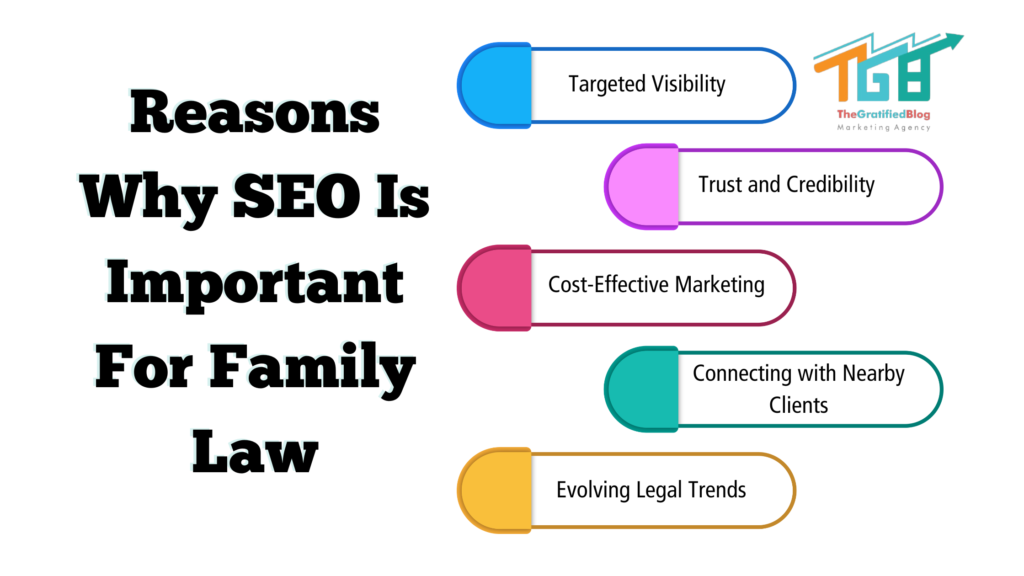
In the realm of SEO for family law, understanding your audience’s needs is paramount. Imagine a distressed parent seeking custody advice, a concerned spouse exploring divorce options, or a family in turmoil requiring legal intervention.
Nearly every law-related query, similar to those mentioned above, begins with the search engine. And your discoverability online directly impacts your ability to respond to these queries. This is where SEO for Family law comes into play.
Over the course of this article, we will explore some proven SEO for family law strategies that will not only boost your online visibility but also elevate your position as a trusted advisor.
5 Reasons Why SEO Is Important For Family Law
As we mentioned previously, the law industry is growing more competitive every day. And here’s how SEO for family law can help.
Targeted Visibility for Specialized Services
Family law covers diverse areas such as divorce, child custody, spousal support, and more. SEO for family law ensures your specialized legal services are at the stardom to handle these cases.
By optimizing your website for relevant keywords and phrases, family law firms can attract potential clients who are actively seeking your specific expertise. This targeted visibility not only saves time and resources but also enhances the likelihood of attracting clients who genuinely require your services, resulting in a higher conversion rate and more meaningful client relationships.
Trust and Credibility in Sensitive Matters
Family law cases often involve deeply personal and emotionally charged issues. Clients seeking family law services are not just looking for legal expertise; they also seek compassion, understanding, and trust. SEO for family law plays a pivotal role in building trust and credibility online. When your family law firm consistently appears at the top of search engine results for relevant queries, it conveys authority and reliability.
This can reassure potential clients that you are dealing with a reputable firm that has a track record of successfully handling sensitive family matters. As trust is a cornerstone of client-attorney relationships in family law, SEO indirectly contributes to building and maintaining these crucial bonds.
Cost-Effective Marketing for Competitive Markets
Traditional marketing methods such as billboards, print advertising, or radio spots can be prohibitively expensive, especially for smaller law firms. SEO offers a cost-effective alternative. By investing in SEO, family law practices can compete with larger firms on a level playing field in the digital arena.
Rather than pouring substantial resources into conventional advertising channels, SEO allows your firm to allocate their budgets more efficiently, focusing on strategies that deliver measurable results. This cost-effectiveness makes SEO an essential component of marketing for family law, enabling you to maximize their outreach without breaking the bank.
Local SEO helps in Connecting with Nearby Clients
Family law cases often require close collaboration between attorneys and their clients. Clients need to meet their attorneys in person, attend court hearings, and participate in various legal proceedings. This emphasizes the significance of local SEO for family law firms.
Local SEO strategies, such as optimizing Google My Business listings, ensuring NAP (Name, Address, Phone) consistency, and generating positive online reviews, enhance a firm’s visibility within its geographic area of operation. This ensures that potential clients seeking local legal representation can easily find and connect with a family law practice, further emphasizing the critical role of SEO in serving the immediate needs of the community.
Staying Updated with Evolving Legal Trends
Family law firms that regularly update their websites with informative content on legal developments demonstrate their commitment to keeping clients informed.
By providing resources such as articles, blog posts, and FAQs on evolving legal trends, SEO not only enhances a firm’s online visibility but also positions it as a knowledgeable and reliable source of information. This proactive approach to content creation and sharing reinforces your firm’s reputation as a trusted advisor in the dynamic field of family law.

15 Actionable Strategies To Optimize SEO For Family Law
Creating a SEO strategy that works for family law is no brainer. Follow these steps to optimize and boost your firm’s online presence.
- Keyword Research
Start your SEO for family law journey by understanding the power of keywords. They guide potential clients to you.
Begin by brainstorming words and phrases your target audience might use when searching for family law services. Dive deep into keyword research tools like Ahrefs or SEMrush to discover relevant and high-traffic keywords specific to your niche. Remember, your choice of keywords will define your SEO success.
Your website content is the bridge between you and your potential clients. Optimize it thoughtfully by weaving your chosen keywords naturally into your blog posts, service pages, and other content.
Craft compelling, informative, and engaging articles that not only inform but also resonate with your audience. Share your expertise, address their concerns, and demonstrate your dedication to helping them through challenging family law matters.
- Local SEO for Family Law
In the world of family law, location matters. Local SEO is your secret weapon. Claim and optimize your Google My Business listing, ensuring your Name, Address, and Phone Number (NAP) information is consistent across the web.
Encourage satisfied clients to leave reviews and ratings. Cultivate a strong online presence within your community, and watch your local rankings soar.
- Mobile Optimization
Today, your potential clients are searching for family law services on their smartphones.A mobile-optimized website is essential in SEO for family law. Ensure your website is mobile-friendly, offering a seamless experience.
Responsive design is your ally here, automatically adjusting your site’s layout for various screen sizes. By doing so, you make it easy for users to access your valuable information whenever and wherever they need it.
- Website Speed and Performance:
Slow websites can be a deal-breaker. A fast-loading site keeps visitors engaged and encourages them to explore further.
Compress images to reduce load times, and implement cache optimization to serve content faster. Speed is the essence of user satisfaction and higher rankings. Your visitors, and Google, will appreciate it.
- On-Page SEO
When you’re crafting content, remember the rule of three: meta tags, header tags, and schema markup. These elements are your SEO power trio. Craft engaging meta titles and descriptions that entice clicks.
Organize your content with clear header tags (H1, H2, H3). Finally, use schema markup to give Google a roadmap of your content, increasing your chances of appearing in rich snippets and other valuable search features.
- Off-Page SEO
Building backlinks is like building trust. Reach out to authoritative websites in the legal and family law niches for guest posting opportunities. Build a network of relationships with other professionals in your field.
Monitor your backlinks regularly to ensure they’re high-quality and relevant. Your link-building efforts are the bridge that connects you to a broader audience.
- Social Media Presence
Social media isn’t just for sharing cute cat videos. It’s a powerful tool for promoting your family law practice.Use social media as a potent tool in promoting your SEO for family law strategy. Regularly update your social profiles with informative content, case studies, and legal insights.
Engage with your audience, answering their questions, and providing value. Social signals matter to Google, and they’ll boost your rankings.
- Online Reviews and Reputation Management
Online reviews can make or break your reputation. Encourage satisfied clients to leave reviews on platforms like Google, Yelp, or Avvo.
Respond professionally to negative feedback and use it as an opportunity to showcase your commitment to client satisfaction. A sterling online reputation will not only attract clients but also signal trustworthiness to search engines.
- Legal Directories and Listings
Being listed in legal directories is akin to having your name in the legal phonebook. Select the most relevant directories for your practice area and ensure your profiles are complete and consistent. This helps potential clients find you easily and boosts your online credibility.
- Video SEO
Don’t underestimate the power of video. Create informative videos discussing family law topics and optimize them for search engines. Host your videos on platforms like YouTube and embed them on your website.
Video content not only engages users but also improves your SEO rankings, making you more visible to potential clients.
- Blogging and Content Marketing
Blogging is your tool for ongoing engagement. Develop a content calendar and consistently publish informative articles that address common legal questions.
Share your insights, showcase your expertise, and become a go-to resource for family law information. Promote your blog posts on social media and through email marketing to expand your reach.
- Monitoring and Analytics
Data is your compass in the SEO journey. Utilize tools like Google Analytics and Google Search Console to track keyword rankings and website traffic. Analyze this data to make informed decisions about your SEO strategy.
Monitoring and tweaking your approach based on real-time data will keep you on the path to higher rankings.
- Legal FAQ and Q&A Pages
Imagine creating a dedicated FAQ and Q&A section on your website. Address common legal questions and provide concise, informative answers. Google often uses these as featured snippets, elevating your content’s visibility.
By helping your potential clients find quick answers, you demonstrate your expertise and build trust.
- User Experience and Website Design
User experience (UX) is paramount. A well-designed, user-friendly website reduces bounce rates and keeps visitors engaged. Imagine your website as a well-organized law library, with intuitive navigation and a clean layout.
Prioritize easy access to information and a smooth user journey to ensure visitors stay and explore your services.
Conclusion
SEO is crucial for family law because it ensures your specialized services are visible, builds trust in sensitive cases, offers cost-effective marketing, connects you with local clients, and keeps you updated on legal trends. SEO for family law is vital for visibility, trust-building, cost-effective marketing, local connections, and staying updated. Start by researching keywords and analyzing competitors.
You can start by conducting keyword research and seeing what search terms your competitors pop up on search engines for too. Implement local SEO, optimize your mobile app and web page, and prioritize social media presence. Lasting, utilize content marketing to generate organic traffic, and keep analyzing your SEO results.








No Comments